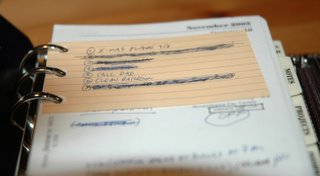What good is paper without a pen? It can still be used for making paper airplanes, but it would be really stupid to use overpriced, pastel-colored Filofax paper for airplanes. So when I made The Switch recently, I had to come up with a writing implement. I already have piles upon piles of pens at home, most of which have been inadvertently (no, really!) taken from various jobs in the past decade. I have a habit of sticking pens in my pockets when I get up to go to a meeting, and they're usually still there when I empty out my pockets at home. So there's been a slow, steady migration of office products from my desk into pen storage receptacles in my home. The pens run the gamut: I have felt-tips; I have ballpoints. I have thick, rubber-coated pens; I have stick-like implements that look like eyeliner applicators. I have green; I have red; I have blue; I have black. I have pens with hotel names on the side. (It's a real weakness of mine: pads and pens inscribed with hotel names. Now that I mention it, it goes beyond pads and pens. We have a basket full of shampoo, conditioner, soap, shower caps, sewing kits, lotion, and mouthwash from various hotels. God, what a freak I am.) I also have a Mont Blanc rollerball that my Dad got me for high school graduation in 1990. Over the years, I have made various attempts to make the Mont Blanc my primary pen. But -- and I hope this is not sacrilegious -- it doesn't write very well. It usually hums along well for a couple weeks, and then it starts skipping badly. A fresh refill will lead to the same result.
On top of all those pens, I also have
pencils. In 1997, while I was in law school, I worked for a summer at a law firm that kept all offices and conference rooms stocked with pencils stamped with the firm's name. They were too good to pass up, so I accumulated a few dozen at home. They're just wood, not mechanical, pencils. Because I have so many, I generally just stop using one when it gets blunt, and move on to a sharp one. So I have a few dozen really blunt pencils at home. I have a few mechanicals sitting around. I bought a bag of them when I was briefly into Sudoku puzzles.
Most calendar users use pens, it appears. Pens are far more pleasant to write with. There is a pleasing sensation of pressure and release when you apply pen to paper. Pencils, on the other hand, scratch along the surface like a nail on brick. The usual hard-leaded pencil makes faint markings, too, with a low level of contrast against the paper. A bold blue pen is easier and more pleasing to read.
However, and here is the kicker:
Pens cannot be erased. Pencils can. For the Filofax user, this presents an interesting conundrum. Plans change. Airlines cancel flights. Meetings get moved. People change their phone numbers. The way I see it, I have three options in dealing with these uncertainties:
1. Use a pen and the scratch-out method of planner modification. This is a low-maintenance approach, but leads to a messy planner. At the same time, though, there's something satisfying about scratching something out with a flourish and making new notations. It's artistic, it's a license to violate the lines on the page. It's fun, like playing in the mud or running through the rain without an umbrella. But when plans change repeatedly, the fun stops and your planner page can start to look like a Jackson Pollock painting.
2. Use a pencil and the erasure method of planner modification. Neat, orderly. But completely unaesthetic. There's no fun it in it, and your eyes have to strain to discern the pencil's faint markings. There's no art in it, either. This is what an accountant would do. I am a lawyer, which is totally different.
3. Use moveable Post-It, or similar, notes. Ah. A clever end-run around the permanence of ink. Apply ink to the Post-It --
and move when necessary, or replace when plans change substantially. Another advantage is that it preserves valuable calendar space on a small-format planner. In my Filofax, for instance, I would be hard-pressed to fit a lot of specific data about an appointment into the area allotted for the day. I can, however, put that data on a Post-It and stick it right on top of the page, preserving the option of writing appointments on the space below. However, this approach does take some effort. Plus, it may look nerdy.
Thus far, I am using a hybrid of all three approaches. I use the pen for things that are unlikely to change. If I have a pencil handy, and I need to write down something that likely could change, I'll use it. And I'm open to the Post-It idea. When I had to record some flight information relating to a trip my wife is taking next week, I used Post-Its. If the flights change, I can discard the notes. I can also temporarily remove the notes if I need access to the calendar space below.
The pen vs. pencil vs. Post-It debate is likely to rage on in my life for some time. Hopefully, the distraction will not be so great as to utterly paralyze me.


